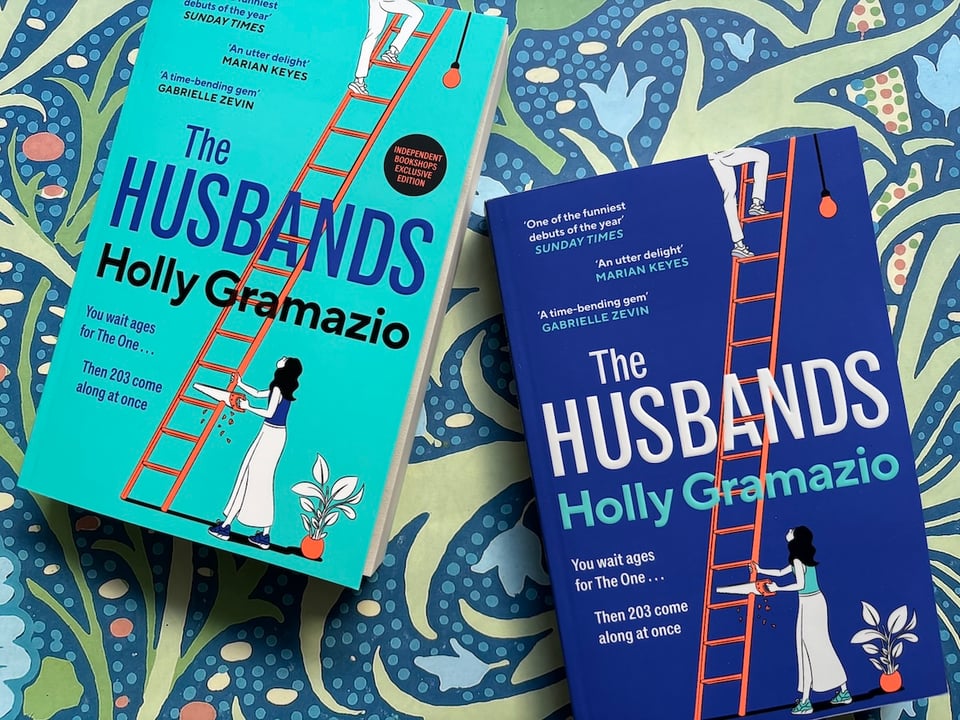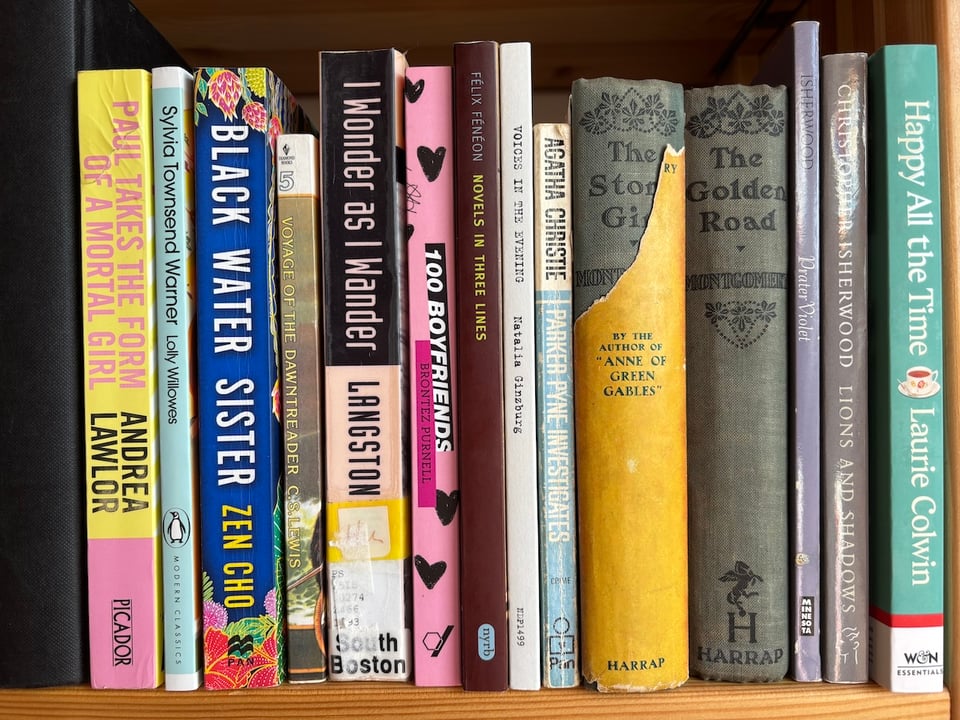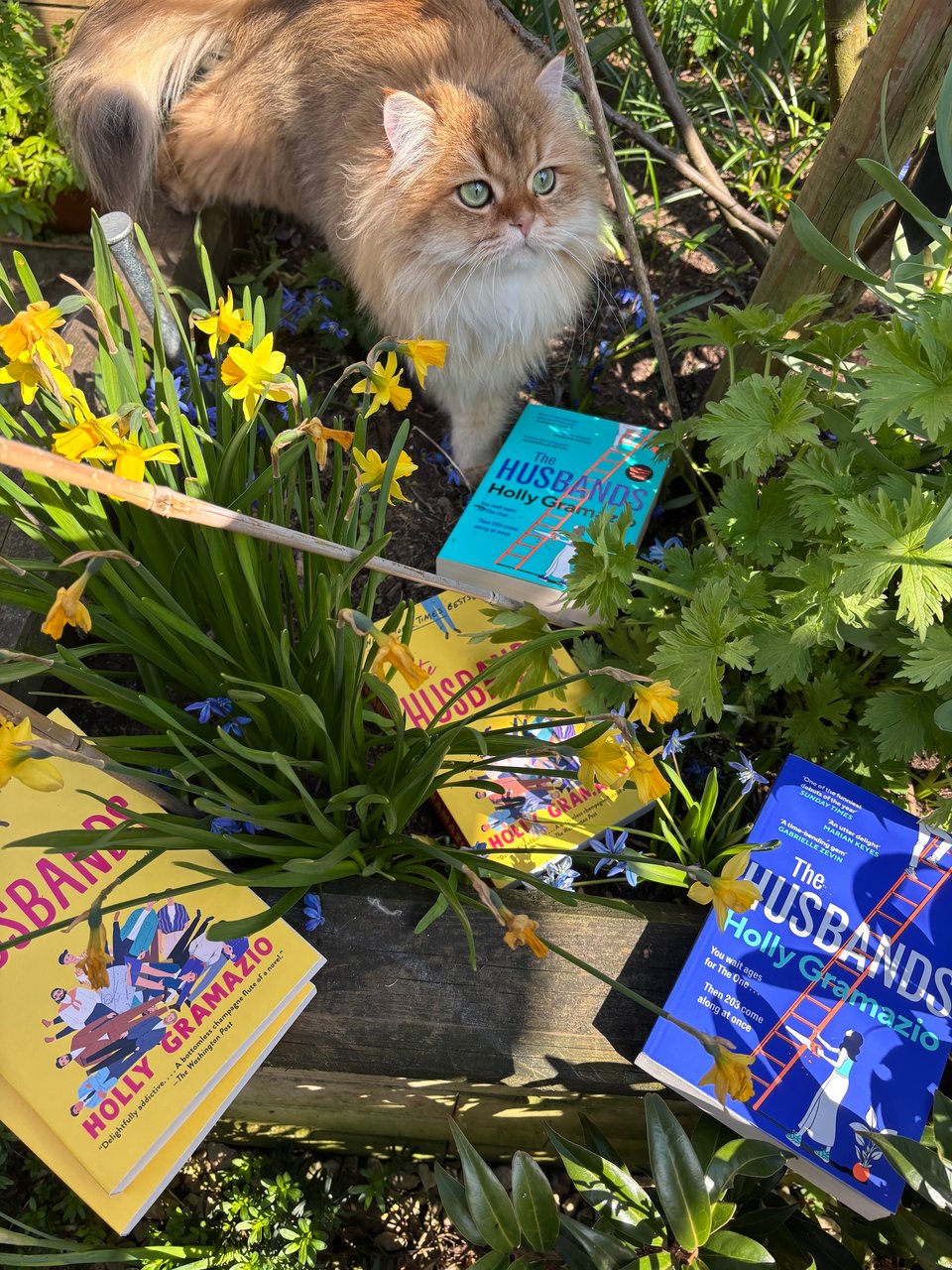UK paperback / some books I love / more Australia facts
!!!! The Husbands is OUT IN PAPERBACK in the UK TODAY!

And it’s a week and a half since its US paperback release. Which is to say, if you were waiting for the paperback to pick up a copy, the time has come; and if you’ve read it already and liked it, now would be a particularly appreciated time to mention that on eg your social media of choice, in a pub, at the library, etc etc.
A HUSBANDS QUESTION
When the US paperback came out, I wrote a newsletter answering the question I’m most often asked about The Husbands. For the UK paperback I thought it might be fun to instead answer the question about it that I most enjoy being asked. The question gets phrased a few different ways, but basically it’s something like: are there books you took inspiration from, books that were useful to you when you were writing it?
I love answering this for a few reasons, and one of them is that while I was editing, I started assembling a shelf specifically of those books — books that do something that I was finding difficult, and that do it beautifully, and that I looked to to help figure out what my approach should be. This is the shelf:

And okay, maybe for some of these the connection to The Husbands is a little oblique. There are a few main clumps of book in it, I think — a few different questions I wanted to figure out an answer to.
1. One Weird Thing: how could I get readers to accept the whole “infinite husbands coming out of the attic” premise? And, somehow trickier: how could I get them to accept that Lauren had accepted it? For this I had a big rummage through a lot of books, but these felt particularly useful:
Andrea Lawlor’s Paul Takes The Form of a Mortal Girl (2017)
Sylvia Townsend Warner’s Lolly Willowes (1926)
Zen Cho’s Black Water Sister (2021)
They’re set in the real-ish world, at least initially, but with a big weird thing that readers have to buy into (protagonists who, respectively, can change their body at will; who sell their soul to the devil; and who are haunted by the ghost of their dead grandmother). The books deal with it very differently: PTTFOAMG just takes the setup for granted and so we do too; Lolly Willowes puts its weird thing halfway through and Lolly accepts it straight away; Black Water Sister puts its weird thing right up front and carries us through with the protagonist as she goes through her own “wait, wait, WHAT is going on” realisation.
2. So Many Husbands: how could I write a lot of husbands that felt meaningfully distinct, that had their own different spaces within Lauren’s life, and that people wouldn’t get mixed up?
Brontez Purnell’s 100 Boyfriends (2021)
Félix Fénéon’s Novels in Three Lines (1906, sort-of)
Natalia Ginzburg’s Voices in the Evening (1961)
Basically any Agatha Christie
These books deal with a lot of characters or tiny incidents and make them feel distinctive and memorable. Ginzburg and Christie are obviously very different writers. But they’re both so, so good at this specific thing, at picking the right details, at bringing those details back to mind if a character recurs without it feeling too “ohhhh, it’s Dave, doing that thing he always does, which is to yell IT’S ME, DAVE”. Also: I was a bit anxious about reading 100 Boyfriends in case it was too directly doing the same sort of thing I was trying to do, but I shouldn’t have worried; obviously it’s not doing the same thing at all! But Purnell is just great at finding ways to characterise dozens of different moments and relationships and ways of being in them.
3. Holding it all together: I had a main character who was constantly moving into new situations with a new bunch of people — how could I make sure the book still had a sense of continuity and cohesion to it?
C.S. Lewis, The Voyage of the Dawn Treader (1952)
Inkle and Meghna Jayanth, 80 Days (2012 — this one’s a game so it’s not on the shelf)
Langston Hughes, I Wonder As I Wander (1956)
This problem is something that travelogues and any Going On A Big Journey narratives have to deal with all the time! I loved these three in particular, the rhythms of their recurring themes and how they held some very disparate threads and adventures together. (Dawn Treader has always been my favourite Narnia book.)
4. Making time pass. I had a world that was constantly resetting, but time was still passing — how could I make that passing time feel real?
L.M. Montgomery, The Story Girl (1911) and The Golden Road (1913).
These books, lesser-known Montgomeries, are about a group of cousins having extremely minor adventures. They’re very explicitly about the transition from childhood to the adult world, the older members of a generation of kids growing up and moving on, the intense slippy joy of a long summer when you know the next summer is going to be different. And it gets at that feeling explicitly but also through all the little details of the natural world, the over-the-top abundance of spring, an unexpected cold day in September. So I ransacked that feeling for The Husbands, and tried to keep the natural world ticking along in the margins, as a way to make Lauren and the reader feel real time passing in the world. (Also, these books are so explicit about their themes and the ways their characters behave and feel that they helped make me feel less… embarrassed?… to just say things out loud sometimes, to accept that it’s not impermissibly gauche to say explicitly how a character feels or what’s going on. You’re allowed to do it! You don’t just have to leave clues and go “well the reader will figure it out” every time!)
5. Finding the right tone: this is the hardest question to articulate, because mostly tone was the first thing I found when I was writing the book. But one thing I did have to poke around to figure out — related to my feeling above that it’s kind-of undignified to just say anything out loud — was how to get at Lauren’s feelings at moments when she wasn’t always particularly good at self knowledge:
Christopher Isherwood, Lions and Shadows (1938), Prater Violet (1945)
Laurie Colwin, Happy All The Time (1978)
Isherwood is so, so good at the details of noticing someone, their little physical movements or stance or dress, how that lets us see straight into their heads. I was interested in whether I could get at Lauren’s internal state in the same way, using her physical feelings and little motions and letting people see through them. Honestly, this is one of the things that didn’t totally work; for a start, when I’m stressed a lot of my emotions feel like they’re situated behind my knees, and it turns out that isn’t where everyone else keeps their feelings??? But it was still a useful thing to try for getting the early drafts written! And Happy All The Time? Well, it’s so wonderful at people spending time together, little details of life, ways to enjoy being with someone without understanding them.
STRONG RECOMMENDATION IF YOU’RE WRITING SOMETHING: A SHELF LIKE THIS
I loved having this shelf of books to hand; it felt good to look at them, to pull them out while I was writing, to see them lined up there and go ah yes, my Advisors. Plus it was a way to stay enthusiastic about the process: to flick through the books and go oh I love how this does such-and-such and feel excited for the possibilities of doing something similar-but-different. To have a little distraction that wasn’t the internet! It feels a bit embarrassing and basic to admit to this, as if surely writers are meant to operate on a more abstract level, to internalise the lessons of other writers rather than literally have a pile of books sitting a metre away to look at, but I dunno, it really worked for me. And I’m having a great time populating the shelf for the book I’m writing now, and even sneakily — way down at the bottom of the bookshelf — collecting a few for the book I’m pretty sure I want to write after that.
ALSO: I’M BACK FROM AUSTRALIA
Okay, that’s enough book stuff! Other news: I’m just back from Australia, which was great. Here are some things I always forget about and then enjoy when I’m there:
The way Adelaide restaurants don’t always have their own toilets; instead they have weird deals with nearby buildings so that you have to go out into an alleyway or down a flight of stairs and through a long fluoro-lit corridor beneath two other restaurants, or in one case literally take a key to get into the semi-abandoned office building next door and wee there
Constant innovation in abbreviation (new to me this time: “nine dotto” to mean “nine dollars exactly”, “flatties” for flat whites)
It’s not like there’s more crime, but people talk about the specifics of crime more; knowing eg which of your local shops has had a bit of crime going on (whether as a service they provide or a set of adverse circumstances they’re operating under) is a sort of social capital in a way that it mostly isn’t among people I know in London
The English-language internet is quiet during the day, because the UK and the US are asleep, it’s incredible
Adelaide’s pints are 425mL, the perfect size in my opinion, but also sometimes pubs will just go “oh we don’t do pints, we only do handles or glasses” and you’ll say “oh uhhh so what’s a handle” and they’ll say “it’s these glasses we have with a handle?” and they’ll hold one up, and you’ll say “hmm what’s a glass then” and they’ll hold up a subtly different glass that also has a handle
This year’s bad food trend is the “seasonal burrata”; you still can’t get a coffee after 3pm in Melbourne but you also can’t get a bad coffee in Melbourne so maybe it balances out; the birds are loud and wonderful.
MISC
Here’s another podcast I was on recently: Top Shelf at Merrick Library, hosted by Carol Ann Tack. What a delight to be on a library’s podcast!
Finally saw Conclave, which contained all the gossip and costumes I was promised, great
Now Play This, the experimental games festival some friends and I started a decade ago, is wrapping up: this is its final year. It’s on 11-12 April at Somerset House as part of the London Games Festival; the current director and producer, Luján Oulton and Lexi Stevens, have been putting so much work in and it should be a really lovely last go round. If you’re interested in games and playful design, and you’re near London, do come along. Here’s Lu’s writeup of what to expect, and here’s my post on behalf of the board about why this 11th edition will be the last.
Okay, that’s it for now, here’s a gratuitous picture of Maddy with the paperbacks:

pls remember to loudly mention how much you liked The Husbands when walking through the paperback section of your local bookshop,
Holly